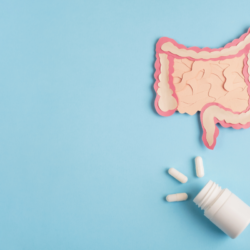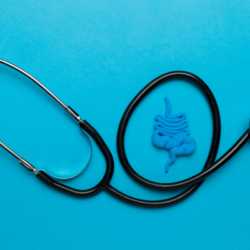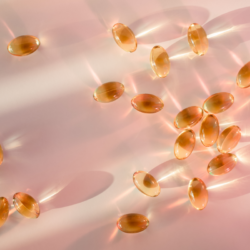Ageing, an inevitable part of human biology, is attracting growing interest in research andtherapeutic innovation. One of the promising candidates for slowing this process is resveratrol. In this article, we take an in-depth look at the bioactive properties of resveratrol and its potential for modulating cellular ageing.
What is cellular ageing?
Cellular ageing is a complex intrinsic biological phenomenon characterised by a gradual alteration in homeostasis at cellular and tissue level. This process is multidimensional, encompassing biochemical, physiological and structural changes that impact the functionality of cells and tissues over time.
Accumulation of cellular damage
One of the fundamental mechanisms of cellular ageing is the progressive accumulation of damage to cellular macromolecules, notably nucleic acids, proteins and lipids. This phenomenon is largely the result of oxidative stress, which is caused by an imbalance between the production of free radicals and antioxidant mechanisms, and is a major contributor to the accumulation of this damage.
Mitochondrial dysfunction
Mitochondria, often referred to as the‘ energypowerhouses ‘ of cells, also undergo functional and structural changes with age. Mitochondrial dysfunction is associated with reduced ATP (adenosine triphosphate) production, increased production of free radicals and altered energy metabolism.
Cellular senescence
Cellular senescence is a state ofirreversible cell cycle arrest, generally triggered by DNA damage or stress signals. Senescent cells accumulate with age and contribute to reduced organ function by secreting pro-inflammatory factors and modifying the extracellular matrix.
Epigenetic alterations
The epigenome, which regulates gene expression without altering the DNA sequence, also undergoes changes during ageing. Modifications such as DNA methylation and histone modifications can lead to changes in gene transcription, thus affecting cell function.
Clinical implications
Taken together, these mechanisms contribute to impaired organ function, manifested clinically by increased susceptibility to chronic disease, slower post-traumatic recovery and reduced quality of life. Understanding the nuances of cellular ageing in detail is of paramount importance for the development of therapeutic strategies to modulate this process.
What causes cellular ageing?
Cellular ageing is the result of a complex combination of endogenous and exogenous factors. Although research in this area is constantly evolving, the following are some of the most commonly recognised causes:
-
Oxidative stress
Oxidative stress results from an imbalance between the production of free radicals, highly reactive chemical species, and the capacity of antioxidant mechanisms to neutralise them. The accumulation of oxidative damage to DNA, proteins and lipids is considered a significant factor in the ageing process.
-
Telomere shortening
Telomeres, the structures at the ends of chromosomes, shorten with each cell division. When they reach a certain critical size, telomeres become dysfunctional, leading to cell cycle arrest or apoptosis, thus contributing to cell ageing.
-
Mitochondrial dysfunction
Mitochondria play a central role in energy production (in the form of ATP), making them vulnerable to oxidative stress and cumulative damage, leading to a reduction in the cell’s metabolic efficiency and energy production potential.
-
Epigenetic alterations
Alterations in DNA methylation patterns, post-translational histone modifications and microRNA expression can lead to long-lasting changes in gene expression, impacting cell function and longevity.
-
Chronic inflammation
Inflammation is a immune immune response response to infection or tissue damage. However, chronic inflammation can accelerate ageing by producing reactive oxygen species and inducing damage to DNA and other macromolecules.
-
Environmental and lifestyle factors
External factors such asexposure to UV radiation, environmental pollution, smoking, a nutrient-poor diet and lack of physical exercise can all contribute to premature cell ageing.
-
Hormonal dysregulation
The balance of hormones, particularly growth hormones, androgens and oestrogens, changes with age, influencing various cellular processes, including division, differentiation and apoptosis.
What is resveratrol?
Resveratrol is a polyphenol of the stilbene class, widely studied for its antioxidant properties, anti-inflammatory and anti-ageing properties. Derived from a variety of natural sources, this compound has been identified as a potential modulator of various metabolic pathways and cellular transduction signals. It is the subject of numerous scientific studies for its potential beneficial effects on human health.
Where can you find resveratrol in nature?
Resveratrol is mainly found in the skins of red grapes, but also in other fruits such as blackberries and cranberries. It is also present in significant quantities in peanuts and certain seeds.
1-Derived products
This compound is also abundant in certain by-products such as red wine. Fermentation of grapes into wine increases the concentration of resveratrol, although this concentration can vary considerably depending on various factors such as the type of grape and winemaking methods.
2-Other sources
Resveratrol is also found in the roots of certain plants such as Polygonum cuspidatum, commonly used in traditional Asian medicine.
What are its chemical compounds?
The chemical structure of resveratrol is characterised by two phenolic groups linked by a methylene chain. This structure is responsible for its antioxidant properties, enabling it to effectively trap free radicals.
Isomers
Resveratrol exists in two isomers: trans-resveratrol and cis-resveratrol. The first is considered to be the biologically active isomer and is the most commonly studied for its therapeutic properties.
Metabolites
Once ingested, resveratrol is rapidly metabolised into various metabolites, including resveratrol-3-O-glucuronide and resveratrol-3-sulphate, which have also shown biological effects in in vitro studies.
How can resveratrol slow down the ageing process?
Resveratrol is a polyphenolic compound which acts via several biochemical and molecular mechanisms to modulate various cellular pathways. Its action is complex and involves interactions with proteins, enzymes and signalling pathways that play a role in controlling cellular ageing, inflammation, oxidation and other biological processes.
Activation of SIRT1
One of the most studied pathways in relation to resveratrol is the activation of sirtuin 1 (SIRT1), an enzyme that plays a key role in regulating cellular ageing. SIRT1 deacetylates various target proteins, thereby influencing processes such as DNA repair and energy metabolism.
Modulation of the AMPK pathway
Resveratrol also activates AMP-activated protein kinase (AMPK), an enzyme that regulates energy metabolism and helps to reduce oxidative stress and inflammation.
Inhibition of inflammatory pathways
This polyphenol can inhibit the cyclooxygenase (COX) pathway and nuclear factor kappa B (NF-κB), thereby reducing the production of inflammatory mediators such as prostaglandins and cytokines.
How can the action of resveratrol be boosted?
It may be worthwhile combining resveratrol intake with other food supplements capable of boosting its beneficial effects on the human body.
With flavonoids
Resveratrol works in synergy with other antioxidant compounds such as flavonoids, often found in the same food sources, to increase their ability to neutralise free radicals.
With omega-3 fatty acids
Studies have also shown that resveratrol can have a synergistic effect with fatty acids fatty acids omega-3 fatty acids in modulating inflammation and protecting against cardiovascular disease.
With vitamins
The simultaneous presence of vitamins such as vitamin C and E can improve the effectiveness of resveratrol in terms of antioxidant capacity.
What are the health benefits of resveratrol?
Resveratrol is a compound that has attracted a great deal of interest in the scientific community for its wide range of potential beneficial effects on human health. Although more research is needed to confirm these benefits, current data point to several important areas of action.
Anti-oxidant
One of the most studied benefits of resveratrol is its antioxidant potential. This compound is capable of neutralising free radicals and protecting cells against oxidative stress, a key factor in cell ageing, cardiovascular disease and other pathological conditions.
Anti-inflammatory
Resveratrol also has notable anti-inflammatory properties. It inhibits the production and release of inflammatory mediators such as cytokines and prostaglandins, by modulating pathways such as nuclear factor kappa B (NF-κB) and cyclooxygenase (COX).
Neuroprotection
Studies have suggested that resveratrol may play a role in neuroprotection. It has been shown to promote synaptic plasticity and neurogenesis, while reducing inflammation and oxidative stress in the central nervous system.
Cardiovascular protection
Resveratrol has been associated with protection against cardiovascular disease. It improves endothelial function, reduces oxidation of low-density lipoprotein (LDL) cholesterol and inhibits platelet aggregation.
Anti-cancer
Although studies are still preliminary, resveratrol has shown anti-cancer potential. It can induce apoptosis in cancer cells and inhibit their proliferation and invasion.
Regulation of metabolism
Resveratrol has also been studied for its role in regulating metabolism. It can improve insulin sensitivity, reduce blood sugar levels and modulate lipid metabolism.
In short, resveratrol offers a variety of potential health benefits that make it a subject of ongoing interest in biomedical research. It is important to note that although the experimental data are promising, further clinical studies are needed to validate these effects.
What is the impact of resveratrol on longevity?
The scientific community is increasingly interested in the impact of resveratrol on longevity. Several factors suggest that resveratrol could potentially contribute to longevity:
Blood sugar and longevity
Blood sugar levels play a key role in overall health and longevity. Research has shown that lower fasting glucose levels are correlated with a longer lifespan. Resveratrol, by reducing blood sugar levels could have a beneficial impact on longevity. However, it is important to note that research into the effects of resveratrol on longevity remains preliminary, and it is advisable to consult a doctor before taking nutritional supplements.
Antioxidant properties
Resveratrol is an antioxidant present in certain plants in response to stress or injury. It is found in foods such as red wine, grapes, cocoa, peanuts and bilberries. Studies have shown that resveratrol has cardioprotective properties, leading to the hypothesis that the cardiovascular health benefits of red wine may be linked to this antioxidant.
Effects on ageing
Extensive studies have shown that resveratrol may delay or prevent the progression of various diseases, including cancer, heart disease and diabetes in animals. Recent research has also highlighted resveratrol’s role in the ageing process. It activates sirtuins, a class of enzymes involved in longevity and ageing, in particular SIRT1. Activating these enzymes creates a biological environment similar to calorie restriction, a proven method for extending lifespan.
In conclusion, although preliminary data suggest a link between resveratrol and longevity, further research is needed to confirm this impact. Resveratrol has antioxidant properties and can influence blood sugar levels, making it a promising subject for longevity research, but it is important to remain cautious and consult a healthcare professional before incorporating it into a supplementation regime.
Is resveratrol a good brain protector?
It’s true that this antioxidant has attracted considerable interest as a possible brain protector, thanks in particular to studies suggesting links between red wine consumption and a slowing of age-related cognitive decline.
One of the reasons for this effect may lie in resveratrol’s antioxidant and anti-inflammatory properties. These properties enable the compound to neutralise free radicals, which are unstable molecules involved in oxidative stress and cell damage. Oxidative stress is a major component of cerebral ageing and various neurodegenerative diseases.
In addition, resveratrol appears to interfere with protein fragments known as beta-amyloids. These fragments play a key role in the formation of the plaques characteristic of Alzheimer’s disease, a devastating neurodegenerative disorder. By hindering the formation of these plaques, resveratrol could potentially help to prevent or slow down this disease.
Secondly, another way in which resveratrol could protect the brain is by triggering a series of beneficial events. These events could include the activation of cellular repair mechanisms, the promotion of neuronal plasticity (the brain’s ability to adapt and form new connections), and the modulation of cerebral inflammation.
However, despite these promising results, it is important to note that research in this area still raises questions. In particular, there are still uncertainties as to how the human body can effectively use resveratrol as a cerebral protection supplement. The bioavailability of resveratrol and its potential long-term effects are the subject of ongoing studies.
How can I lower my cholesterol levels with resveratrol?
Resveratrol, a polyphenolic compound found in certain foods, has attracted growing interest as a potential means of lowering cholesterol levels in a healthy way. Several animal studies have suggested that resveratrol supplements can have a positive effect on blood fat levels.
A 2016 study fed mice a diet rich in protein and polyunsaturated fats, while administering resveratrol supplements. In fact, these researchers observed a reduction in the average levels of total cholesterol as well as in the body weight of the mice. In addition, levels of HDL cholesterol, considered to be the ‘good’ cholesterol, increased. This finding suggests that resveratrol could have a positive effect on blood lipid management.
The mechanism by which resveratrol influences cholesterol levels appears to be based on reducing the activity of an enzyme that controls cholesterol production. In fact, by inhibiting this enzyme, resveratrol can help to reduce excessive cholesterol production in the body.
As an antioxidant, resveratrol may also play a crucial role in reducing the oxidation of LDL cholesterol, often referred to as ‘bad’ cholesterol. Oxidation of LDL is a process that contributes to the formation of plaque in artery walls, which can lead to cardiovascular problems.
Finally, researchers conducted an interesting study by administering a grape extract enriched with resveratrol to participants. After six months of treatment, LDL cholesterol levels were reduced by 4.5%. In addition, levels of oxidised LDL had fallen by 20% compared with participants who had taken unenriched grape extract or a placebo.
Source:
https://www.ncbi.nlm.nih.gov/pmc/articles/PMC8289612/
https://www.ncbi.nlm.nih.gov/pmc/articles/PMC9326919/
https://pubmed.ncbi.nlm.nih.gov/27781945/
https://www.ncbi.nlm.nih.gov/pmc/articles/PMC4030174/
https://pubmed.ncbi.nlm.nih.gov/17077308/
https://www.ncbi.nlm.nih.gov/pmc/articles/PMC4030174/







